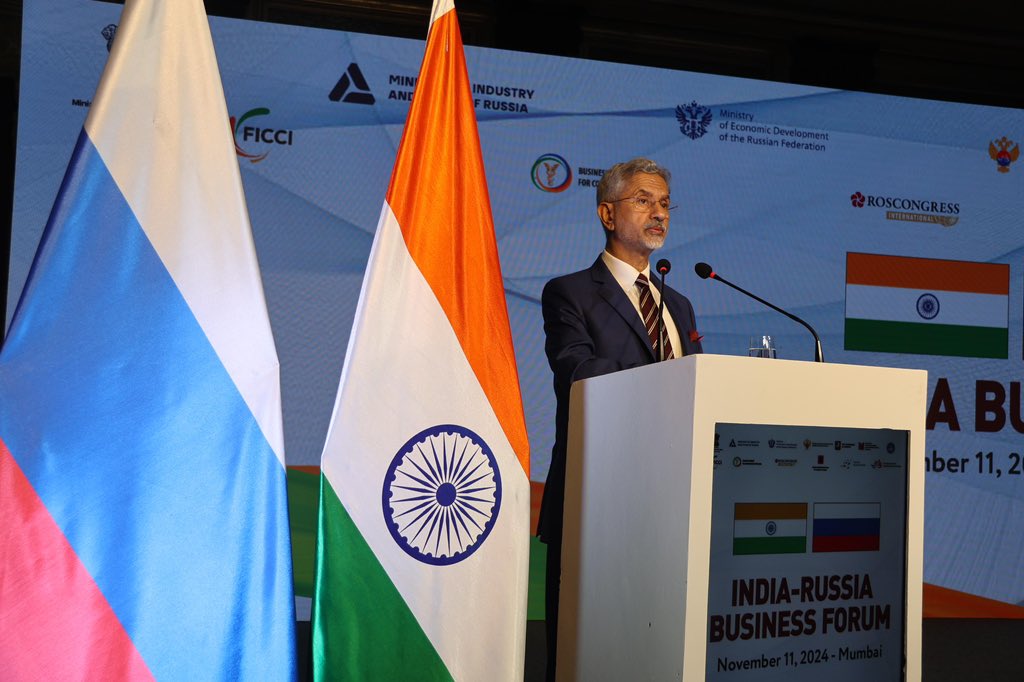
(Photo : Dr S Jaishankar via X)
Moscow Eyes Nuclear, Transport Sectors in India Partnership
In a recent development, Russian First Deputy Prime Minister Denis Manturov highlighted the strengthening of business relations between Russia and India amid external economic pressure. The Deputy PM outlined the development of the transport industry and the potential increase in the nuclear sector as the priority technological areas of future cooperation between Moscow and New Delhi. This meeting took place at the India-Russia Business Forum in Mumbai, ahead of the 25th Session of the Intergovernmental Russian-Indian Commission on Trade, Economic, Scientific, Technical, and Cultural Cooperation.
The forum aimed to foster stronger business ties between entrepreneurs from both nations, featuring sessions on key areas of cooperation, including industrial collaboration, transport and logistics, finance, digital technologies, and interregional connections. External Affairs Minister (EAM) S. Jaishankar highlighted India's long history of strong convergence and deep friendship with Russia, stating that as Moscow consciously focused more deeply on Asia since 2022, many more avenues of cooperation have been created at a time when the world is moving towards greater multi-polarity.
Bilateral Trade and Economic Goals
The bilateral trade between the two nations stands at USD 66 billion, with a goal of reaching USD 100 billion by 2030. However, the balance of trade needs urgent redressal due to its one-sided nature. It is imperative that non-tariff barriers and regulatory impediments are speedily addressed for this to happen. The India-Eurasian Economic Union trade in goods negotiations commenced in March this year, and there is a need to vigorously take it forward.
In his address, Manturov listed the development of the transport industry, including the introduction of unmanned technologies and the transfer of vehicles to alternative fuels, and increasing the potential of the nuclear sector as the key areas of bilateral economic cooperation. He also spoke on providing the healthcare system with advanced medicines and medical devices, as well as strengthening Russia's leading positions in the areas of nuclear medicine, production of vaccines, and development of the cell engineering segment.
National Programmes and Future Cooperation
Manturov mentioned that conditions for high-impact economic partnership between the two countries are formed by two national programmes that are similar in spirit - India's 'Make in India' programme and the course towards technological sovereignty taken by the Russian government. Both of these initiatives are aimed at accelerating the pace of production, developing innovations, and removing infrastructure restrictions.
The Russian First Deputy Prime Minister's visit also includes various bilateral meetings, further underscoring Russia's commitment to strengthening its partnership with India across multiple sectors. This development is a testament to the growing business ties between the two nations, despite the external economic pressure. It also highlights the potential for increased cooperation in various sectors, including the transport industry, nuclear sector, healthcare, and technological advancements.
In conclusion, the strengthening of business ties between India and Russia amid external economic pressure is a significant development in the bilateral relations between the two nations. The focus on areas such as the transport industry, nuclear sector, healthcare, and technological advancements indicates the potential for increased cooperation and mutual growth. This development is a testament to the resilience and mutual commitment of both nations to further their economic cooperation, despite the challenges posed by external economic pressures. The future of this partnership holds promise for both nations, as they continue to navigate the complexities of the global economic landscape.









